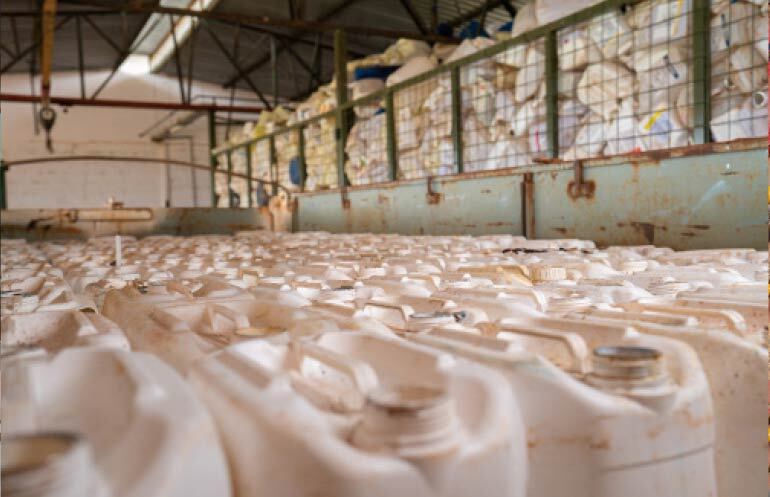The National Institute for Processing Empty Packages (inpEV) represents the industry in the Campo Limpo System, and its mission is to promote the self-sustainable management of the final disposal of empty plant health packaging, environmental and System conservancy with the involvement and integration of all links of the agricultural productive chain.
In order to guarantee this role, inpEV seeks efficiency in all its processes, invests in research, development, awareness and environmental education. The acquired knowledge also paves the road to provide services in the solid waste area as well as partnerships to share experiences. inpEV's integrated management vision allows tackling improvement opportunities within the System itself, which translates into efficiency gains and maximized reuse of disposed packaging. Currently, recycling corresponds to 93% of the entire received volume.
The inpEV headquarters are in São Paulo (SP) and manage 45 of the 411 packaging receiving stations across Brazil. Altogether, the Institute employs 273 professionals. Its member roster is formed by more than 100 crop protection manufacturing companies and entities that represent the sector, distributors and farmers.

MISSION, VISION, AND VALUES
GRI 102-16
Mission
Contribute towards conservation of the environment and the Campo Limpo System by means of self-sustainable management of the final disposal of empty packages of plant health products and by providing services in the solid waste area, with the involvement and integration of all links of the agricultural productive chain.
Vision
Be acknowledged worldwide as a center of excellence in the reverse logistics of empty plant health packaging and in the area of agricultural solid waste, thereby becoming a reference in providing services and making the Campo Limpo System self-sustainable.
Values
- > Integrating attitude: this is the leadership characteristic of the Institute, by valuing team work, integrating the links in the chain and disseminating knowledge.
- > Innovation: it is our dynamics, entrepreneurship, creativity and ability to overcome challenges that position inpEV as a global reference in the reverse logistics of empty crop protection packaging.
- > Integrity: this means behavior based on ethics, respect for differences, transparency in all actions performed and providing accurate information.
- > Social and environmental responsibility: it is the raison d'être of the Institute, which acts as the intelligence center of the Campo Limpo System.
- > Safety: it is the care for the well-being and physical integrity of our employees and all those involved in the Campo Limpo System, as well as the protection of information and assets.
Supply chain GRI 102-9
In 2020, 1,700 suppliers formed the inpEV supply chain. Of this total, 30 are direct suppliers, responsible for inputs, productive equipment and logistical services, transportation and final residue disposal, and 1,670 are indirect suppliers, from which inpEV acquires equipment and machinery, information technology services and support to communication and engagement activities. The most significant category in procurement volume was Logistics, accounting for 35% of the total.
Corporate governance GRI 102-18
To uphold an integrating attitude is one of the inpEV values and is guaranteed by means of the Institute's corporate governance. The administrative and management structure follows good market practices and reflects the principles agreed upon in its by-laws: legality, impersonality, morality and equality.
The Members General Assembly, the Board of Directors, the Board of Auditors and Executive Board are part of its governance. The importance of the Campo Limpo System, of which inpEV is the managing entity, is also reflected in its structure, with representatives from various decision-making bodies.
The General Assembly is the highest body of decision and integrates the Institute's members, crop protection manufacturers and entities that represent the various links of the agricultural chain. Two annual assemblies are held each year to validate inpEV's strategy and assess its performance.
The Board of Directors consists of five representatives of contributing member companies (elected during the General Assembly), ten representatives of member entities (other links of the agricultural chain) and the Institute's CEO. To ensure fulfillment of the by-laws and guarantee asset protection, compliance with the laws in effect and a close relationship among the links of the chain are part of its obligations. The entities that represent the distribution channel and rural producers on the Board of Directors participate in the decisions and are responsible for replicating the information and deliberations within the Campo Limpo System.
The Executive Board is responsible for the general management and strategy implementation. It is chaired by the CEO, an independent hired professional (with no bond to the member companies), appointed by the Board of Directors.
Support structure
Leadership support committees congregate inpEV professionals and specialists to add knowledge and continuously improve management:
> Tax Committee: with the assistance of external consultants, this group facilitates compliance of participants of the Campo Limpo System regarding tax, fiscal and corporate issues.
> Logistics Committee: discusses measures to improve reverse logistics processes and technologies under the scope of the Campo Limpo System.
> Labor Committee: it debates issues relative to the inpEV professionals. The committee also supports the other receiving units of the Campo Limpo System.
> National Central Stations Council: this cross-functional group is formed by managers of the central stations and its roles include general demands of the System and disseminating the best practices to the regional councils, acting to support inpEV's administration.
> Artifact Approval Committee Work Group (WG): assesses, controls and approves the manufacturing of artifacts using empty packages from the Campo Limpo System.
> Packaging Committee WG: evaluates new trends, packaging life-cycle and sector innovations.
CODE OF CONDUCT GRI 102-16 & 205-2
A public document that explains the inpEV principles, values and mission, the Code of Conduct defines the expected posture of employees concerning their relationship with different stakeholders.
Revised in 2017, this material deals with topics such as conflict of interest, respect towards differences, information security, relationship with the public sector and emphasizes inpEV's and its employees' commitment towards social-environmental accountability. The code also defines principles focusing on disseminating knowledge and sponsoring cooperation among all links of the agricultural chain that comprise the Campo Limpo System. The Anti-corruption and Competition policies are also set forth in this code, which explicit the relationship practices with public agents, define rules for donations, which must be approved by the Institute's collegial organ. Other documents such as the inpEV Management Manual and finance and controllership rules also reinforce the commitment with ethical business practices.
All 127 workers hired in 2020 were informed and trained on the Code of Conduct, including the topic on the fight against corruption. The seven third-party professionals contracted along the year were also informed about the topic. inpEV also carries out periodical training for the entire staff. The e-learning scheduled to be applied in 2020 was postponed and will take place in 2021.
Besides this, inpEV elaborated a code in 2020 focusing on suppliers in order to indicate its expectations and anticipated good practices from these business partners, including respect to human rights, ethics and integrity.
Learn more about the Code of Conduct at: www.inpev.org.br
2020 | 2020 | ||||||
|---|---|---|---|---|---|---|---|
COMMUNICATION CONCERNING THE FIGHT AGAINST CORRUPTION GRI 205-2 | % | Informed people | Informed people per region | ||||
South | Southeast | North | Northeast | Midwest | |||
Workers (total) | 46.5% | 127 | 20 | 40 | 6 | 5 | 56 |
Directors | 0.0% | 0 | 0 | 0 | 0 | 0 | 0 |
Managers | 12.5% | 1 | 0 | 1 | 0 | 0 | 0 |
Coordinators | 10.0% | 2 | 0 | 2 | 0 | 0 | 0 |
Receiving station Coordinators/Supervisors | 44.2% | 19 | 4 | 3 | 2 | 2 | 8 |
Administrative | 34.1% | 14 | 4 | 8 | 0 | 0 | 2 |
Operational | 56.9% | 91 | 25 | 26 | 4 | 3 | 33 |
Third-parties | 70.0% | 7 | 1 | 3 | 1 | 0 | 2 |
TRAINING ON THE FIGHT AGAINST CORRUPTION GRI 205-2 | % | People trained | People trained per region | ||||
South | Southeast | North | Northeast | Midwest | |||
Workers (total) | 46.5% | 127 | 20 | 40 | 6 | 5 | 56 |
Directors | 0.0% | 0 | 0 | 0 | 0 | 0 | 0 |
Managers | 12.5% | 1 | 0 | 1 | 0 | 0 | 0 |
Coordinators | 10.0% | 2 | 0 | 2 | 0 | 0 | 0 |
Receiving station Coordinators/Supervisors | 44.2% | 19 | 4 | 3 | 2 | 2 | 8 |
Administrative | 34.1% | 14 | 4 | 8 | 0 | 0 | 2 |
Operational | 56.9% | 91 | 25 | 26 | 4 | 3 | 33 |
